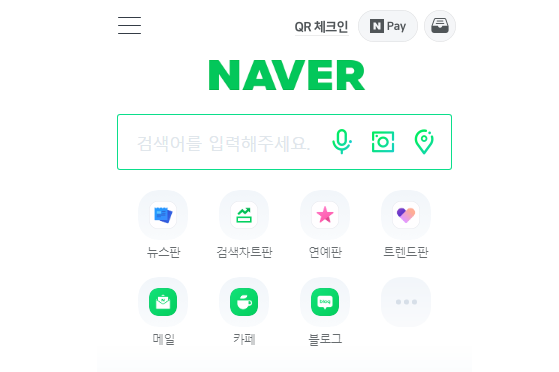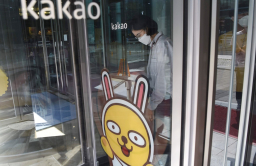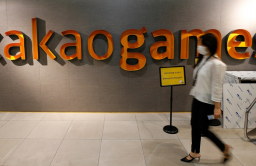-
KOSPI 2812.05 +41.21 +1.49%
-
KOSDAQ 756.23 +6.02 +0.80%
-
KOSPI200 376.54 +6.64 +1.80%
-
USD/KRW 1373 3.00 -0.22%
Naver executives’ treasury share sale may signal business slowdown
Tech, Media & Telecom
Naver executives’ treasury share sale may signal business slowdown
By contrast, archrival Kakao’s executives are amassing shares of their own company, showing their confidence in long-term growth
By
Jul 08, 2022 (Gmt+09:00)
3
Min read
News+

Executives at South Korea’s platform giant Naver Corp. are selling their shares in the company, an indication that the company’s business growth is slowing as the pandemic-created boom is coming to an end, industry watchers said.
Their significant unloading of Naver shares in recent weeks also strengthens the market view that Naver’s second-quarter results due later this month will miss market expectations, likely causing its shares to fall further, they said.
According to the Financial Supervisory Service (FSS) on Friday, six senior executives, including Kim Joo-kwan, chief of Naver Group & CIC (Company In Company), have sold their holdings of Naver’s shares over the past month. None of Naver’s key executives reported any meaningful purchase of its shares during the period.
Data showed Kim recently exercised his stock option rights and a week later sold them in the market to cash out his stocks worth more than 1 billion won ($768 million).
Five other executives have also dumped their shareholdings to monetize their stocks to the tune of 200 million won each.

STAGNATING GROWTH
Market watchers have voiced concerns over stagnating growth of the country’s two largest platform companies – Naver and Kakao Corp. – as e-commerce and other online businesses show signs of easing with the COVID-19 pandemic turning into an endemic.
According to financial information provider FnGuide, the market consensus for Naver’s second-quarter sales and operating profit is 2.01 trillion won and 362.3 billion won, respectively.
More recently, brokerage firms, in their research notes, said they expect Naver’s second-quarter results to come even below the FnGuide’s estimates.
Last April, Naver delivered disappointing first-quarter earnings, stoking concerns that its growth is stalling.
The company saw its advertisement and e-commerce businesses, which account for more than two-thirds of its total revenue, tumble in the first quarter, with online transactions on its platform falling amid rising inflation.

Naver also reported a weak quarterly performance in other businesses, including fintech, content and cloud.
Analysts said higher marketing and labor costs arising from its aggressive recruitment of developers also hurt earnings in the January-March period.
“A weakening performance at platform operators is a global phenomenon. That’s not just a problem for Naver. Such companies will suffer from an economic slowdown across the globe,” said an industry official.
KAKAO EXECUTIVES BUYING COMPANY SHARES
While forecasting that both the platform giants will see weaker sales and profits in coming quarters, analysts said they expect Kakao to perform better than its crosstown rival Naver.
Kakao is a household name in Korea, with its operations spanning various sectors, including digital content, mobility, games and fintech, but long walked in the shadow of Naver as the companies duel in the largely overlapping businesses.

Last year, Kakao briefly overtook Naver as the industry’s highest-grossing company on its home turf by posting higher quarterly sales revenue than its rival.
Unlike Naver, Kakao’s executives raised their holdings of the company’s own shares in recent weeks, FSS data showed.
Shin Won-geun, chief executive of Kakao Pay Corp., the group’s fintech unit, bought 1.14 billion won worth of the company’s shares from the market over the past month. Two other executives have also purchased a combined 1.58 billion won in treasury shares.
Three senior executives at KakaoBank Corp., including Chief Strategy Officer Kim Seok, have bought a combined 464 million won worth of shares in their company.
“We expect tough years ahead. But our executives’ share purchases represent their confidence in the company’s long-term growth and their determination to support share prices,” said a Kakao Corp. official.
On the Korea Exchange, Naver’s shares finished 1.6% higher at 249,000 won on Friday, compared with the broader Kospi index’s 0.7% gain. Kakao Corp. shares closed down 1.6% at 71,800 won.
Write to Jeong-Soo Hwang at hjs@hankyung.com
In-Soo Nam edited this article.
More To Read
-
 Tech, Media & TelecomNaver’s web browser Whale challenges global rivals
Tech, Media & TelecomNaver’s web browser Whale challenges global rivalsJul 05, 2022 (Gmt+09:00)
-
Jun 08, 2022 (Gmt+09:00)
-
May 12, 2022 (Gmt+09:00)
-
May 04, 2022 (Gmt+09:00)
-
Apr 22, 2022 (Gmt+09:00)
-
 Shareholder activismNaver emerges as Hanjin KAL’s white knight with stake purchase
Shareholder activismNaver emerges as Hanjin KAL’s white knight with stake purchaseApr 17, 2022 (Gmt+09:00)
-
 Tech, Media & TelecomNaver, Kakao shares to fall further on sluggish outlook
Tech, Media & TelecomNaver, Kakao shares to fall further on sluggish outlookApr 12, 2022 (Gmt+09:00)






